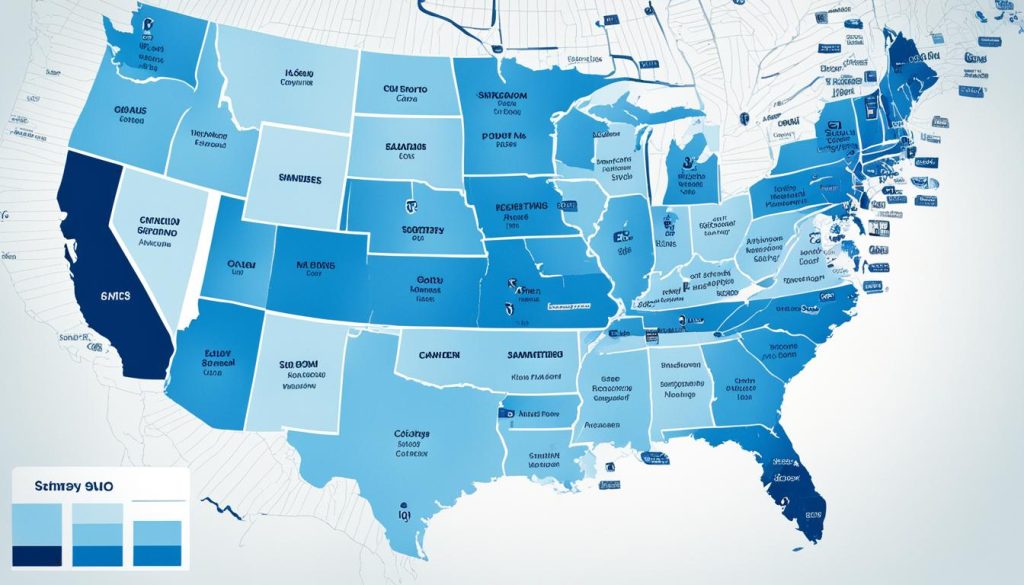Plumber Salary Insights: What to Expect
Did you know that the average annual salary for plumbers in the US is $63,215? With a salary range of $29,500 to $100,000, the plumbing industry offers a wide spectrum of earnings. Whether you’re considering a career as a plumber or already working in the field, understanding the factors that influence plumber salaries is essential.
Key Takeaways:
- Plumbers in the US have an average annual salary of $63,215, ranging from $29,500 to $100,000.
- Salary variations are influenced by factors such as location, experience level, licensure, specialization, and union membership.
- Plumbers have experienced an average salary growth of 9% over the past five years.
- The projected job growth rate for plumbers from 2018-2028 is 2%, resulting in approximately 9,100 new jobs.
- Regional variations exist, with states like Alaska, Oregon, and North Dakota offering higher plumber salaries.
Factors Affecting Plumber Salaries
When it comes to determining plumber salaries, several factors come into play. Let’s explore the key factors that can influence a plumber’s earning potential.
Location
Location plays a significant role in determining plumber salaries. Metropolitan areas, such as Toronto, Vancouver, and Montreal, often offer higher wages due to the higher cost of living. Plumbers working in these areas can expect to earn higher salaries compared to their counterparts in smaller towns or rural areas.
Experience
Just like in any profession, experience is crucial in determining a plumber’s earning potential. Entry-level plumbers with little to no experience can expect to earn around $40,000 per year. As plumbers gain more experience and expertise in their field, their earning potential increases. Experienced plumbers with a solid track record can make over $80,000 annually.
Licensure
Having the proper licensure can also have a significant impact on a plumber’s salary. Licensed plumbers, who have completed the necessary training and passed the required exams, typically earn around 10% more than their non-licensed counterparts. Obtaining the necessary licensure can open up higher-paying job opportunities and increase earning potential.
Specialization
Specializing in a particular area of plumbing can also lead to increased earnings. Plumbers who acquire additional certifications or expertise in areas such as gas fitting, backflow prevention, or green plumbing may be able to command higher salaries. Specialized skills are highly valued in the industry and can provide plumbers with a competitive edge when negotiating their salaries.
Union Membership
Belonging to a union can provide plumbers with higher wages, better benefits, and improved job security. Unions negotiate collective bargaining agreements that include higher pay scales for their members, ensuring that unionized plumbers receive competitive wages and fair compensation for their work.
Considering these factors can help plumbers understand the various elements that contribute to their overall earning potential. By strategically leveraging location, experience, licensure, specialization, and union affiliation, plumbers can work towards maximizing their salaries in the industry.
Average Plumber Salary: Current Trends and Statistics
As a plumber, it’s important to stay informed about the latest salary trends and statistics in your industry. Understanding the average plumber salary, salary growth, job outlook, and regional variations can provide valuable insights into your earning potential. Let’s take a closer look at the current landscape.
Salary Growth and Job Outlook
Over the past five years, plumbers have experienced a steady increase in their average salary. In 2024, the average annual salary for plumbers in the US reached $63,215. This upward trend indicates a salary growth of 9%, reflecting the growing demand for skilled professionals in the plumbing industry.
Looking ahead, the job outlook for plumbers remains promising. The projected job growth rate from 2018 to 2028 is 2%, with approximately 9,100 new jobs expected to be created. This steady demand for plumbers is driven by factors such as population growth, the need for infrastructure maintenance, and the rise in environmentally-friendly plumbing practices.
Regional Variations
It’s essential to recognize that plumber salaries can vary significantly based on geographical location. Certain states and regions tend to offer higher-paying opportunities for plumbers, while others may have slightly lower wages. Higher-paying states, such as Alaska, Oregon, and North Dakota, stand out as leaders in terms of average plumber salaries.
Urban areas also generally provide higher plumber salaries due to the higher cost of living and increased demand for plumbing services. However, it’s worth noting that skilled plumbers in rural areas can still command competitive wages, especially in regions with a shortage of qualified professionals.
Being aware of the average plumber salary, salary growth, job outlook, and regional variations can help you make informed decisions about your career and financial goals. Whether you’re considering entering the plumbing industry or looking to advance your career, these insights can serve as a valuable guide.
Salary Comparison: Plumbers vs. Other Skilled Trades
When it comes to skilled trades, plumbers are known for their above-average salaries. However, they are not the only ones in the field who earn competitive wages. Electricians and HVAC technicians also offer lucrative career opportunities. While carpenters and welders may have lower average salaries, their experience and specialization can lead to high earnings as well. Ultimately, the best salary in the skilled trades industry depends on individual preferences, skills, and desired lifestyle.
Comparing Salaries in Skilled Trades
Let’s take a closer look at the salary ranges for various skilled trades:
| Skilled Trade | Average Salary |
|---|---|
| Plumbers | Above-average salary |
| Electricians | Competitive wages |
| HVAC Technicians | Lucrative career opportunities |
| Carpenters | Lower average salaries but potential for high earnings through specialization and experience |
| Welders | Potential for high earnings through specialization and experience |
While plumbers and electricians earn competitive wages, HVAC technicians, carpenters, and welders also have the potential to build rewarding careers. The key is to develop specialized skills and gain experience to increase earning potential. Whether someone opts for a career as a plumber, electrician, HVAC technician, carpenter, or welder, their salary prospects can be promising in the skilled trades industry.
Geographical Variation in Plumber Salaries
When it comes to plumber salaries, where you work can make a significant difference. Geographical location plays a crucial role in determining the wages plumbers receive, with factors such as living costs and local economies affecting earning potential. Let’s explore the regional breakdown of plumber salaries across the United States.
Higher Wages in Certain States
States like Alaska, California, and New York often offer higher average salaries for plumbers. These regions have bustling economies and higher living costs, which contributes to the increased wages. Plumbers in these states can expect to earn more compared to their counterparts in other areas.
Lower Wages in Less Densely Populated or Lower-Cost States
On the other hand, less densely populated or lower-cost states may have lower average plumber salaries. This can be attributed to a variety of factors, including a smaller customer base, less demand for plumbing services, or lower living costs. Plumbers working in these regions may earn less compared to those in higher-paying states.
Choose the Right Location for Higher Earnings
If you’re a plumber looking to increase your earnings, considering a move to a region with high demand for your skills can be a smart strategy. By relocating to an area where plumbers are in high demand, you can take advantage of better job opportunities and potentially higher wages. Researching the job market and analyzing regional salary trends can help you make an informed decision.
How to Increase Your Plumber Salary
As a plumber, there are various ways you can boost your earnings and take your career to the next level. By investing in certifications and specialized training, you can enhance your skills and become more valuable to employers. Learning about emerging technologies such as smart home systems and automated plumbing can open doors to higher-paying opportunities in the industry.
Furthermore, building experience and honing your leadership skills can lead to higher-paying supervisory roles or even starting your own plumbing business. By taking on more responsibilities and showcasing your expertise, you can command a higher salary in the field. Additionally, networking with other professionals in the plumbing industry and establishing an online presence can help you attract more clients and increase your income.
Remember, increasing your plumber salary is not just about the technical skills you possess, but also about staying updated with the latest industry trends and networking with others in the field. By investing in continuous education, certifications, and professional development, you can position yourself as a valuable and highly skilled plumber, ultimately leading to higher earning potential.
Source Links
- https://www.bobvila.com/articles/average-plumber-salary/
- https://www.businessin.ca/how-much-does-a-plumber-make-in-ontario/
- https://www.workiz.com/blog/plumbing/average-plumber-salary/
- Investing Wisely: How Windows & Doors in Boost Property Value and Financial Health - April 24, 2025
- The Financial Impact of Personal Injuries: Why Legal Help Matters for Business Owners - April 16, 2025
- The Hidden Financial Costs of Domestic Assault: What Business Owners Need to Know - April 16, 2025













